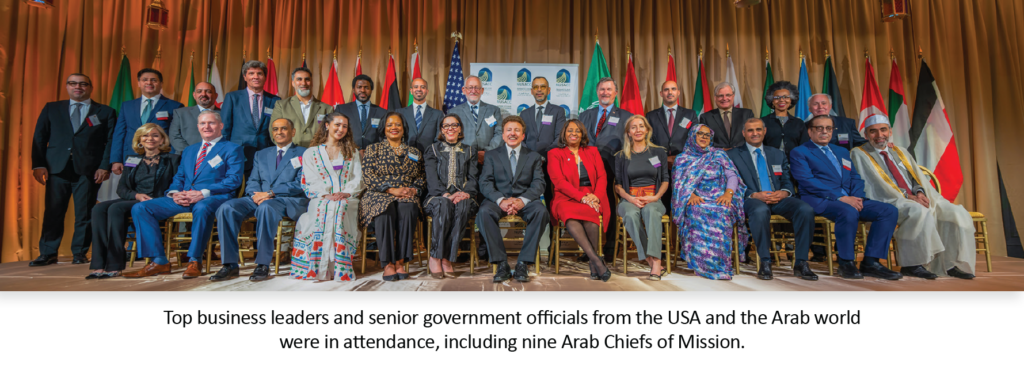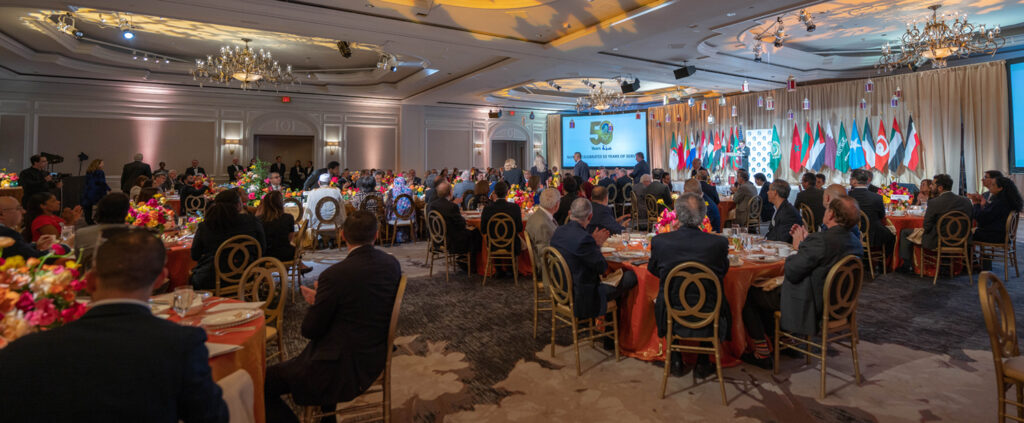NUSACC Hosts its Twelfth Annual Iftar Dinner

“The Most Elegant Iftar in America” Brings Together Top Leaders
from Government, Business, and Civil Society
“Be good to your neighbors, be good to your friends, be good to your
fellow citizens, and be a good human on the surface of the earth.”
– Imam Mohamad Bashar Arafat
The National U.S. – Arab Chamber of Commerce (NUSACC), the official Arab Chamber in the United States, has just hosted its twelfth annual Iftar dinner in honor of the Arab diplomatic community and the League of Arab States. Top business leaders and senior government officials from the USA and the Arab world were in attendance, including nine Chiefs of Mission representing countries across the Middle East and North Africa (MENA).
Because of COVID concerns, this was the first time in four years that NUSACC was in a position to organize an Iftar event. In keeping with COVID protocols, this year’s event was limited to 150 leaders, making the gathering even more exclusive than ever. For the first time, guests flew in from the Middle East to participate.
Held in partnership with the Washington DC Ritz-Carlton Hotel, the NUSACC Iftar has become a time-honored tradition. The Embassy of the United Arab Emirates served as the Lead Sponsor of this year’s event, and this year’s Airline Sponsor was Qatar Airways. Gold sponsors included Assured Communications Advisors, Baladna, Ford Motor Company, General Atomics, the Islamic Chamber of Commerce, ICIEC (a member of the Islamic Development Bank), Midamar, and Truist Bank.
The Importance of Iftar During Ramadan
Breaking the fast (Iftar) during Ramadan is a traditional event performed daily by an estimated 2 billion Muslims around the globe. Ramadan is a holy month of spiritual cleansing in which adherents of Islam rededicate themselves to God, worship, and read the Quran, Islam’s holiest book. The month-long period is marked by fasting, personal sacrifice, self-discipline, and increased generosity, especially toward the underprivileged.
David Hamod, NUSACC’s President & CEO, noted, “Ramadan encourages compassion, tolerance, empathy, forgiveness, and respect. Such attributes are part of Islam and of all the world’s great religions.”
“The NUSACC Iftar celebrates and welcomes people of different faiths, providing us with an opportunity to ‘break bread’ and share fellowship,” Hamod went on to say. “This year was particularly special because the Holy Month of Ramadan coincided with Easter and Passover.”
NUSACC Iftar: Celebrating Diversity
The NUSACC Iftar, now in its twelfth year, was the first of its kind. Today, it is widely regarded as the most elegant Iftar in America, in large part because of the event’s partnership with The Ritz-Carlton, the Luxury Brand Leader of Marriott International.
“We were honored to partner with NUSACC for the annual Iftar gathering. The Ritz-Carlton family prides itself on building strong relationships within our community, and this evening was evidence of that,” said Bradley Cance, General Manager of The Ritz-Carlton, Washington, DC. “Together with NUSACC, we created a memorable Iftar dinner that celebrated our diverse community.”
Cance concluded, “On behalf of the Ladies and Gentlemen of The Ritz-Carlton, we truly value our relationship with the National U.S. – Arab Chamber of Commerce, and we look forward to working together within this incredible global community.”
Ritz-Carlton leaders from up and down the Eastern Seaboard participated in this year’s event, including General Managers from three other Ritz properties in the greater Washington DC area: Rishi Malhotra (Georgetown), Emanuele Fissore (Pentagon City), and Olivier Lau (Tysons Corner).
In a drawing held at the end of the night, four fortunate dinner guests won complimentary stays at the four Washington DC area Ritz-Carlton properties.

Honoring the Diplomats
NUSACC’s Iftar dinner provides an opportunity to gain a better understanding of Islamic customs and traditions. The event also highlights Arab embassies and consulates, as well as the League of Arab States, which formally recognizes NUSACC as a business gateway between the United States and the 22 countries of the Arab world.
At this year’s event, participants honored H.E. Salah Sarhan, who has served as the Arab League’s Chief Representative in the United States since 2015. Ambassador Sarhan concluded his service as Chief Representative on April 1, 2023.
“The National U.S. – Arab Chamber of Commerce is proud to partner with Arab embassies and consulates across the United States,” said Hon. James Smith, NUSACC Board member and former U.S. Ambassador to Saudi Arabia. “We work closely with these diplomats on a daily basis, enabling NUSACC to strengthen U.S. – Arab trade and investment.”
Imam: Ramadan is an “Intensive 30-Day Course”
Imam Mohamad Bashar Arafat – President of the Islamic Affairs Council of Maryland, and Founder of the School for Religious Diplomacy (for Leadership Development and Global Cooperation) – offered remarks after dinner.
“The Holy Month of Ramadan is a time of peace, reflection, patience, acceptance, charitable efforts, and spiritual growth for Muslims around the world,” he noted. “It is a month in which we should collectively do everything possible to prevent the violence and brutality that is being perpetrated today against innocent people here in the United States and around the world.”
Imam Arafat characterized Ramadan as an “intensive 30-day course” that can bring about lifelong change. “Practiced properly,” he said, “you will become a better human being – not only healthier through a strict diet, but also morally, ethically, and spiritually.”
He went on: “As the Holy Qur’an says, we have to change from being a Muslim to becoming a Mu’min – a believer – because the believer is the one whose heart has already become the house and the temple of God. They are no longer living for himself or herself. They already subdued their ego and greed and chose to do things for the pleasure of the Divine, Allah.”
Imam Arafat decried polarization in today’s society, pointing to the fact that there is not enough understanding and compassion. “Muslims, Christians, Jews, and other religious leaders have a responsibility to address these issues,” he noted, pointing out that the “Holy Qur’an emphasizes that religious diversity, ethnic diversity, and cultural diversity are the will of God.”
The Imam concluded, “Be good to your neighbors, be good to your friends, be good to your fellow citizens, and be a good human on the surface of the earth. Ramadan Mubarak!”
Tales of Three Lands
During the Iftar celebration in recent years, NUSACC’s David Hamod has shared stories about his travels in the Arab world. He does this, he says, because these anecdotes highlight the very human interactions between Americans and peoples of the Arab world. These stories also serve to combat misconceptions about the MENA region.
This year, Hamod talked about some experiences in Iraq and Libya, two frontier economies. In addition, he discussed a “third land” – the Heartland of America – which has also been subjected to stereotyping.
“I grew up in the Midwest – in Iowa and Nebraska – so it has been with immense pride that our Chamber has organized visits to the Heartland for a number of Arab Ambassadors over the years,” Hamod said.
“In the spirit of tolerance, Heartlanders welcome interactions with different cultures,” he noted. “They understand that almost all of us in the United States arrived here from somewhere else, and our forebears depended on the generosity of others to ‘make it’ here in the USA.”
In the heart of the Heartland, he said, Iowa and Nebraska produce over 14 percent of America’s food to the tune of $60 billion per year.
Supply chains have received two major shocks in recent years – one from COVID, and one from the invasion of Ukraine – so products from America’s Heartland are in big demand globally. In a world that is increasingly food insecure, America’s Breadbasket is offering solutions based on precision agriculture, water management, sophisticated grain storage facilities, superior logistics, and careful stewardship of natural resources.
So, what do these three lands have in common? “The three need each other,” Hamod said. “Libya and Iraq have huge agricultural potential. Farmers in the Heartland are positioned to help Arab countries produce large quantities of food in efficient and sustainable ways.”
Second, Hamod said, “I believe that these three lands share a commitment to trust and tradition. Like much of the Arab world, people in the Heartland do business the ‘old fashioned way’ – based on honesty, respect, and trust.”
“The Holy Month of Ramadan reinforces the belief that every human being should have access to water and nutritious food,” Hamod noted. “Thankfully, the United States is uniquely positioned to help the Arab world to establish food security and to facilitate today’s historic transition from hydrocarbon-based economies to knowledge-based economies.”
“This transition will take time and patience,” Hamod concluded, “but I have growing confidence that emerging leaders in the Arab world will follow the proper path – the righteous path – to point the way for future generations.”
America’s Heartland: A Global Commitment
America’s Heartland is committed to providing food, feed, and fuel (ethanol) to the world. These farmers and technologists take their responsibility to help feed the world very seriously.
As a general rule, Heartlanders are inquisitive about other cultures. As part of their connection to the world, Midwesterners are typically very good at helping other cultures to “feel at home” in the USA.
The assimilation of Afghan refugees is a case in point. Since August 2021, when the U.S. withdrew from Afghanistan, U.S. states have agreed to resettle more than 60,000 Afghan refugees across the USA.
Iowa and Nebraska, with a total population of just five million people, have committed to adopting well over 2,000 Afghan refugees. That’s about the same level adopted by the State of New York.
Nebraska and Iowa are adopting more than Arizona, Florida, Massachusetts, Michigan, and New Jersey. In fact, only six states have agreed to accept more Afghan refugees than Nebraska and Iowa.
To view the report in PDF, please click here.
To read the previous article, please click here.
Visit Arab America’s blog here!








